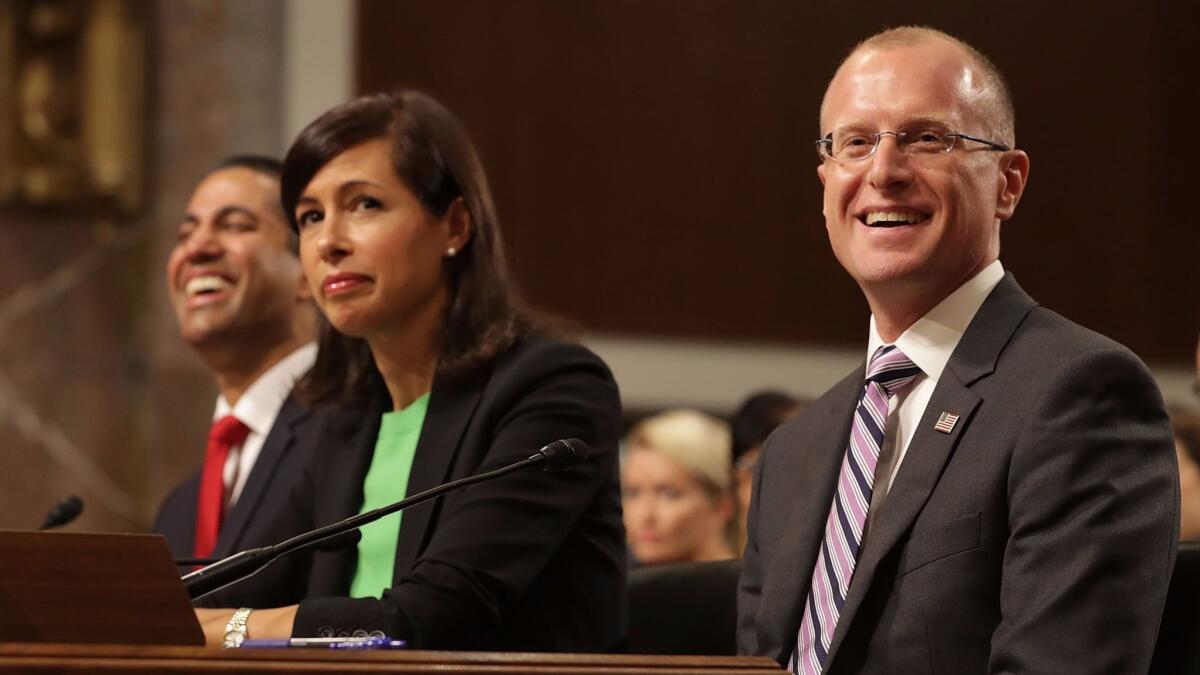Democratic senator questions independence of FCC nominee who worked for the agency’s chairman

- Share via
Reporting from Washington — A leading Senate Democrat on Wednesday questioned the independence of a Federal Communications Commission nominee who worked as a top aide to the current chairman.
If confirmed, Brendan Carr, a Republican nominated last month by President Trump, would be the commission’s swing vote on Chairman Ajit Pai’s proposal to dismantle tough net neutrality rules for online traffic.
Carr hasn’t publicly stated his position on the matter, but the assumption is he would support Pai, a fellow Republican and his former boss.
Members of the Senate Commerce Committee did not ask Carr for his position on net neutrality during a confirmation hearing Wednesday.
But Sen. Bill Nelson (D-Fla.), the committee’s top Democrat, pressed him to name an example of an issue on which he “substantively disagreed” with Pai.
Carr, an attorney who served as a legal advisor to Pai from 2014 to 2017, promised to be independent but said he did not want to discuss advice he gave to Pai.
“I’ll make my own decisions. I’ll call it the way I see it based on the facts, the record and what I think serves the public interest independent of where other people come out,” Carr told Nelson.
“I think my record over the years shows that I’m not a shrinking violet and am confident standing on my own feet and making my own decisions,” said Carr, who became the FCC’s general counsel in January.
Nelson asked the question several times and was not happy with Carr’s answer.
“Mr. Carr, that is not confidence-building for those of us who are wondering about your future independence from the boss that you have so ably served in the last number of years,” Nelson told him.
With a Republican Senate majority, Carr should have no trouble being confirmed. No Republicans at the hearing raised any concerns about Carr.
He was joined at the confirmation hearing by Pai, who has been nominated for a second five-year term, and Jessica Rosenworcel, who was nominated to fill a Democratic vacancy on the five-person commission.
Rosenworcel served as a commissioner from May 2012 until January, when her term expired after Senate Republicans would not bring her renomination up for a vote.
If all are confirmed as expected, the FCC would have a 3-2 Republican majority and be poised to roll back the net neutrality rules put in place in 2015 when the commission was controlled by Democrats. Rosenworcel voted for those rules. Pai opposed them.
The rules prohibit broadband providers from slowing Internet speeds for video streams and other content, selling faster lanes for delivering data or otherwise discriminating against any legal online material.
To enforce the rules, the FCC took the controversial step of classifying broadband as a more highly regulated utility-like service under Title 2 of federal telecommunications law. Broadband providers strongly opposed the move.
Pai has proposed repealing the Title 2 designation and wants to return to what he called “the light-touch regulatory framework” that allowed the Internet to flourish. The FCC voted 2-1 along party lines in May to start a formal rulemaking process on Pai’s proposal.
The White House said Tuesday it backed Pai’s move but wants Congress to pass net neutrality legislation to keep the rules from changing each time the FCC’s majority switches.
“We support the FCC chair’s efforts to review and consider rolling back these rules, and believe that the best way to get fair rules for everyone is for Congress to take action and create regulatory and economic certainty,” said White House Deputy Press Secretary Sarah Huckabee Sanders.
Commerce Committee Chairman John Thune (R-S.D.) has pushed for legislation that would enshrine the FCC’s rules without using the Title 2 oversight that opens the door to rate regulation and other stricter oversight in the future.
Net neutrality supporters staged a day of action last week, urging the public to tell the FCC not to change the rules.
More than 10 million online comments have been filed at the FCC during a 90-day period that ended on Monday, the most the agency has ever received about an issue. The public has until Aug. 16 to file replies to those comments.
Thune said Wednesday he was concerned about reports that thousands of pro-net neutrality comments are suspicious, including 300,000 from the same address in Russia.
“How do you weigh these kinds of suspicious comments with those comments that are more substantive and based on sound policy arguments?” Thune asked Pai.
Pai said the FCC wanted to set up an open process to allow the public to comment but understands that “there have been concerns on all sides about the veracity of some of these comments.”
The agency will weigh the comments and make a judgment “based on those facts that are in the record,” Pai said.
Twitter: @JimPuzzanghera
ALSO
Are net neutrality supporters wasting their time by filing comments at the FCC?
Net neutrality supporters say online rally is just the start of the fight to keep tough FCC rules
More to Read
Inside the business of entertainment
The Wide Shot brings you news, analysis and insights on everything from streaming wars to production — and what it all means for the future.
You may occasionally receive promotional content from the Los Angeles Times.











